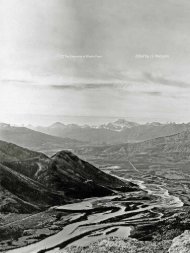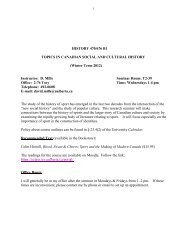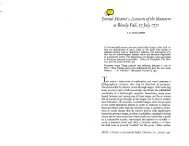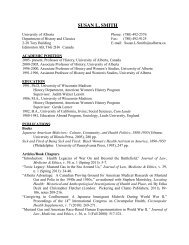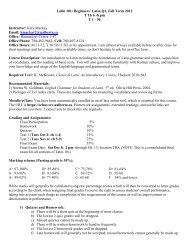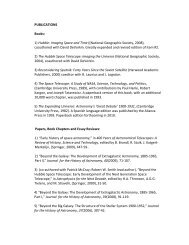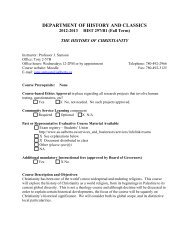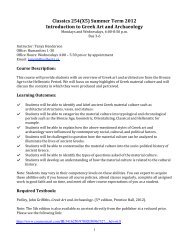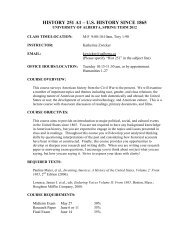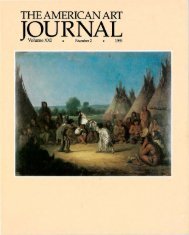C Ihe Ladies c cu. V'VVAN - History and Classics, Department of
C Ihe Ladies c cu. V'VVAN - History and Classics, Department of
C Ihe Ladies c cu. V'VVAN - History and Classics, Department of
- No tags were found...
Create successful ePaper yourself
Turn your PDF publications into a flip-book with our unique Google optimized e-Paper software.
Notes to Pages 25-2g, 202 247<strong>cu</strong>t bank, <strong>and</strong> a tangle <strong>of</strong> willow. With Mabel on one arm, Ipicked up the wife on the other, <strong>and</strong> carried them aboutfifty yards across the shallows, where we were able to walkagain till camping time. Flapjacks <strong>and</strong> dessicated [sic] potatoesfor supper."The boys are doing wonderfully, having <strong>of</strong>ten to patchthe boat, which means unloading everything, <strong>and</strong> overturningit on shore. This afternoon, as we approached along hairpin bend in the river, the boys advised that I takethe passengers across a short portage, while they took theboat around. We started, with veils over our faces, for themosquitees [sic] are bad. Soon we came to a bog, with thickwillows. I carried Mabel over, set her down on a mossy bed,then went back <strong>and</strong> carried the mother over. Then weclimbed a hill, through clouds <strong>of</strong> mosquitoes, made our waythrough a rocky gully to the river bed again, <strong>and</strong> preparedto make a fire, only to find my matches were wet <strong>and</strong>useless. I had been in the river to my armpits, guiding theboat. We had to fight the enemy for about two hours,before the boat came up. They had ascended nineteenrapids rounding the bend. Then we made camp."My good Wellington boots have fallen to pieces, fromwater <strong>and</strong> stones. Some <strong>of</strong> the boys are wearing out twopairs <strong>of</strong> moccasins a day."Through many bad rapids to-day, but the stream isnarrowing. After dinner we passed the last rapid, haVingreached the level plateau <strong>of</strong> the Divide. Now our travel isslower, having to pole or row the boat. The banks are verybad, snags many, <strong>and</strong> mendings frequent. Sometimes thereis hardly room to take the boat round the bend, the rivuletbeing so crooked, though the water is deep. We arehemmed in by willows <strong>and</strong> alder on the banks."The stream winds interminably. We made a portageacross a grassy plain to a lake, then to another-Bell Lake,crossing which we camped for dinner. Here I paid <strong>of</strong>f three<strong>of</strong> the boys, with orders on the fort, <strong>and</strong> sent them home.Eight <strong>and</strong> a half days is good time."Sunday. We are very high, with mountains on threesides <strong>of</strong> us, <strong>and</strong> a mist all around. We take a well-earnedrest, for there are more heavy days ahead. Usual services.One walk I saw mountain sheep high up among the rocks."Had to carry the boat, <strong>and</strong> luggage about a third <strong>of</strong> amile, as the narrow stream running westward is so cloggedwith willows we cannot get through it. The two boys at oneend, <strong>and</strong> I at the other, found the boat a stiff burden!"("Sunrise" 66-8)(Vyvyan's misspelling-'Whitaker"-has been correctedthroughout the book <strong>and</strong> field notes.)we have to tie up to the river bank beside a pile <strong>of</strong> logs, inorder to replenish fuelAccording to Harold Innis, steam-powered vessels consumedalmost one cord <strong>of</strong> wood per hour (348), but Sherwood Plattcites a different rate. He <strong>and</strong> his three companions, includingAlfred E. "Jake" Driscoll (who went on to become governor <strong>of</strong>the state <strong>of</strong> NewJersey from 1947 to 1954), worked on the Slave<strong>and</strong> Mackenzie rivers aboard the SS Distributor in return for freepassage from Fort Smith to the Rat River on the steamer'ssecond trip <strong>of</strong> 1926. The work included hauling wood from theriverside piles to the ship's furnace, which, according to him,consumed it at a rate <strong>of</strong> "five cords an hour" (12).Field Note for Thursd,!)! 3june3 or4 RCeSThe Royal Canadian Corps <strong>of</strong> Signals operated the northernwireless stations. See the note, t'As for cOIlullunications,"under Chpt II.CHAPTER 6: DAYS ASHORE (6-13 JUNE)In this chapter, both the accounts <strong>of</strong> the late-night visit to thewife <strong>of</strong> the factor (Leggo) at Fort Fitzgerald <strong>and</strong> the women'shabit <strong>of</strong> breakfasting with coat thrown over nightgown areembellished, to emphasize Dorrien Smith's superior sense <strong>of</strong>propriety, which is allayed by Judge Dubuc's example. Also inthe book but not in the field notes, Vyvyan compares themonotony <strong>of</strong> visiting women <strong>of</strong> the North with the monotony<strong>of</strong> visits paid to women in the Australian bush (36), which shedescribed in more detail in her autobiography, Roots <strong>and</strong> Stars(154-56). There is no precedent in the field notes for thepenultimate salutations <strong>and</strong> last paragraph <strong>of</strong> the chapter.Fort ChipewyanThe oldest continuously oc<strong>cu</strong>pied white settlement in Alberta,Fort Chipewyan was established in 1788 on the south shore <strong>of</strong>Lake Athabasca at Old Fort Point by NWC partner Roderick





